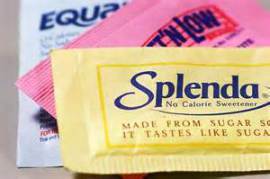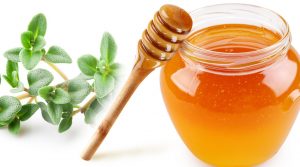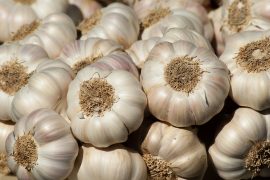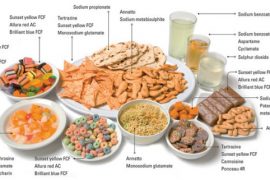Do you have a sweet tooth? If you do you’re not alone. Two hundred years ago, the average American ate only 2 pounds of sugar a year. Nearly fifty years ago in seventies, the average American ate 123 pounds of sugar per year. Today the average American consumes 152 pounds of sugar a year. That is equal to nearly 3 pounds of sugar a week or 6 cups a week. Is it any wonder that we’re seeing such high rates of diabetes and obesity? (1)
The World Health Organization recommends that adults should get no more than 10% of their calories from sugar. This equals 13.3 teaspoons of sugar per day (based on 2,000 calories per day). (2)
Hidden sources of sugar
Sugar can be hidden in lots of processed foods. Condiments such as barbeque sauce or ketchup are laden with sugar. On average ketchup can contain 5 grams of sugar per tablespoon, which is a little over a teaspoon of sugar. Check your boxed cereal as some varieties can contain upwards of 32-40 grams of sugar per a half cup serving, which equates to eight to ten teaspoons of sugar. Additional sneaky sources of sugar include high fructose corn syrup (HFCS), soda, breads and other processed foods.
Poor choices for sugar substitutes
In the past many individuals have looked to no calorie artificial sweeteners as an option to minimize blood sugar fluctuations and to manage caloric intake. But research is linking artificial sweeteners to dysbiosis and metabolic abnormalities. (3)
Research is showing that in fact artificial sweeteners may have the opposite effect on your body. Artificial sugars can change the way your brain responds to the sweet taste and actually send signals to your brain to eat more. (4)

What science says about artificial sweeteners
This study in The Journal of Nutrition found that artificially sweetened drinks increases diabetes risk. It also showed that individuals of normal weight who consumed artificial sweeteners were actually more likely to have diabetes than individuals who were overweight. (5)
This 2014 study found that artificial sugars such as saccharin can change the composition of gut bacteria. This imbalance can lead to glucose intolerance, a step towards metabolic syndrome and diabetes. (3)
The Center for Science in the Public Interest (CSPI) currently ranks artificial sweeteners on their AVOID list. (6)
Sucralose –Found in Splenda may have no effect on blood sugar, it certainly has a lot of negative effects on the body. (7)
Saccharin-Found in products such as Sweet N’ Low. While it is calorie free, a 2012 study found a very close correlation between artificial sweeteners such as saccharin, sucralose and an increase in inflammatory bowel diseases. (8, 9)
Aspartame– Sold under brand names like Equal, Aminosweet and Nutrasweet is a non-nutritive sweetener. Research shows links to leukemia, lymphoma, breast cancer and migraines. In addition some individuals are unable to process phenylalanine (a key component of aspartame). Although rare, phenylketonuria (PKU) means that these individuals should avoid all aspartame products. (10)

Natural sweetener options
It’s important to realize that all natural sweeteners are going to add additional calories to your diet. Some may elevate your blood sugar similar to sugar. By choosing natural sweeteners, you are avoiding unnecessary additives and chemical processing for more natural ingredients. It is important to buy organic whenever possible and always read labels as some companies do put in unnecessary additives.
If you are craving something sweet, whole fruit will always be a better option. Sweeteners are simply concentrated sugars without the fiber to help regulate blood sugar.
Some healthier natural sweeteners include:
| Organic Honey | Stevia | Dates | Coconut Sugar |
| Maple Syrup | Blackstrap Molasses | Balsamic Glaze | Fruit Puree |
| Brown Rice Syrup | Fruit Jam | Yacon Syrup | Coconut Nectar |
| Monk Fruit | Inulin-Chicory Root | Mannitol | Xylitol |
| Berry Powders | Lucuma |
Low GI Sugar Options for Diabetics
So what do you do if you have sweet cravings and you’re diabetic? Your best option is to look for sugars that are low on the glycemic index. Some examples include:
Lakanto– This product is made from erythritol, which is a sugar alcohol. This zero calorie sweetener doesn’t affect blood sugar levels, it also doesn’t feed candida. It can be used in baking recipes and to sweeten drinks.
Xylitol-This natural sugar is found in many fruits, vegetables and birch trees. It doesn’t affect insulin levels and due to its dental benefits it is frequently found in gum and toothpaste.
Stevia-This sweetener is zero calories and low on the GI scale. It is available in a liquid and powdered form. Avoid overly processed brands that may contain additional additives.
Inulin-This soluble fiber with a sweet taste is usually found in a powdered form online and in health food stores. This is a great option for diabetics and individuals with candida.
Coconut Palm Sugar-This sweetener is higher in nutritional value with vitamins B1, B2, B3, B6 and C, it is also high in Iron, Magnesium, Potassium and Zinc. Some companies mix this with cane sugar so be sure to read the label. This sugar can be found as a nectar or in granules.
Conclusion
Based on research artificial sweeteners are really not the healthy alternative to sugar that was once believed. In fact they may be a factor in additional health problems you experience such as weight gain, headaches and gastric distress.
Look for healthier natural alternatives and be sure to limit your intake if you have blood sugar issues such as metabolic syndrome or diabetes.
Always choose whole fruit first to alleviate your sweet cravings. Ultimately the greatest benefit to your health is to reduce or eliminate all forms of added sugar.
References:
- N. (2014, August). How Much Sugar Do You Eat? You May Be Surprised! Retrieved April 15, 2018, from https://www.dhhs.nh.gov/dphs/nhp/documents/sugar.pdf
- How Much Is Too Much? (2014, December 18). Retrieved April 15, 2018, from http://sugarscience.ucsf.edu/the-growing-concern-of-overconsumption/#.WtPTnojwaUl
- Suez, J., Korem, T., Zeevi, D., Zilberman-Schapira, G., Thaiss, C. A., Maza, O., . . . Elinav, E. (2014, September 17). Artificial sweeteners induce glucose intolerance by altering the gut microbiota. Retrieved April 15, 2018, from https://www.nature.com/articles/nature13793
- Swithers, S. E. (2013, September). Artificial sweeteners produce the counterintuitive effect of inducing metabolic derangements. Retrieved April 15, 2018, from https://www.ncbi.nlm.nih.gov/pmc/articles/PMC3772345/
- Y., J., D., B, B., C., E, L., . . . S. (2015, December 09). Artificially Sweetened Beverage Consumption Is Positively Associated with Newly Diagnosed Diabetes in Normal-Weight but Not in Overweight or Obese Brazilian Adults | The Journal of Nutrition | Oxford Academic. Retrieved April 15, 2018, from https://academic.oup.com/jn/article/146/2/290/4630839
- Chemical Cuisine. (n.d.). Retrieved April 15, 2018, from https://cspinet.org/eating-healthy/chemical-cuisine
- Sucralose. (n.d.). Retrieved April 15, 2018, from https://cspinet.org/eating-healthy/chemical-cuisine#sucralose
- Saccharin. (n.d.). Retrieved April 15, 2018, from https://cspinet.org/eating-healthy/chemical-cuisine#saccharin
- Qin, X. (2012, April 21). Etiology of inflammatory bowel disease: A unified hypothesis. Retrieved April 15, 2018, from https://www.ncbi.nlm.nih.gov/pmc/articles/PMC3332284/
- Aspartame. (n.d.). Retrieved April 15, 2018, from https://cspinet.org/eating-healthy/chemical-cuisine#aspartame
This article was originally posted at The Hearty Soul








